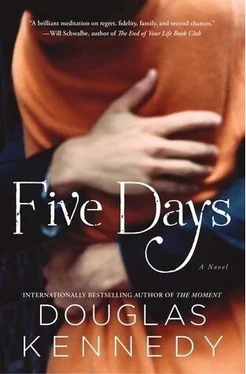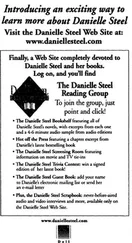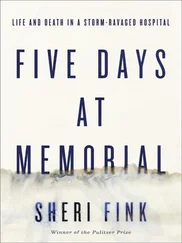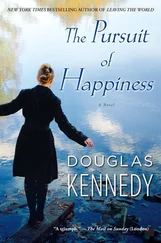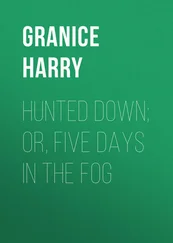Douglas Kennedy - Five Days
Здесь есть возможность читать онлайн «Douglas Kennedy - Five Days» весь текст электронной книги совершенно бесплатно (целиком полную версию без сокращений). В некоторых случаях можно слушать аудио, скачать через торрент в формате fb2 и присутствует краткое содержание. Жанр: Современная проза, на английском языке. Описание произведения, (предисловие) а так же отзывы посетителей доступны на портале библиотеки ЛибКат.
- Название:Five Days
- Автор:
- Жанр:
- Год:неизвестен
- ISBN:нет данных
- Рейтинг книги:3 / 5. Голосов: 1
-
Избранное:Добавить в избранное
- Отзывы:
-
Ваша оценка:
- 60
- 1
- 2
- 3
- 4
- 5
Five Days: краткое содержание, описание и аннотация
Предлагаем к чтению аннотацию, описание, краткое содержание или предисловие (зависит от того, что написал сам автор книги «Five Days»). Если вы не нашли необходимую информацию о книге — напишите в комментариях, мы постараемся отыскать её.
Five Days — читать онлайн бесплатно полную книгу (весь текст) целиком
Ниже представлен текст книги, разбитый по страницам. Система сохранения места последней прочитанной страницы, позволяет с удобством читать онлайн бесплатно книгу «Five Days», без необходимости каждый раз заново искать на чём Вы остановились. Поставьте закладку, и сможете в любой момент перейти на страницу, на которой закончили чтение.
Интервал:
Закладка:
‘So is that where you want to live in the next life?’ I said, pointing upwards to the penthouse.
‘In my dreams. That used to be the Ritz. Now it’s apartments for the super-rich. Even in reserved, button-down Boston — where ostentation and flashing the cash are still considered bad taste — there is, like everywhere else these days, truly serious money floating about. Especially with the density of mutual funds and bio/info tech people concentrated here.’
‘Those mutual fund folk get two-to-three-million-dollar bonuses every year.’
‘Minimum two-to-three-million. If you’re at the top of that financial food chain, it’s probably somewhere over ten million. Unreal, isn’t it?’
‘What makes it even more unreal is that everyone who is not a member of that wealth club — by which I mean anyone who doesn’t make over a couple hundred thousand a year — is struggling. I speak from experience. The last eighteen months, with Dan out of work, have been very tight. As much as he hates the stockroom job he starts on Monday, the fact that we’ll have an extra three hundred dollars a week. well, there will finally be a little breathing space. Not exactly “take the family skiing in Aspen” breathing space. Just “we can now meet our basic bills” breathing space. God knows I don’t begrudge anyone their success or wealth. I chose my profession, my career. I also chose to stay in Maine where I knew that the salary would be small. And I am also someone who hates to complain.’
‘There you go again, making apologies for yourself, instead of just speaking the truth. Which is, in America nowadays, you either have big bucks or you just about get by. And I speak as a Republican — yet one who was raised with the idea that the middle class could actually have a very good life; that if you were a teacher, a nurse, a cop, an ambulance driver, a soldier, you could still have the house, the two cars in the garage, the two weeks by the lake somewhere every summer, put your kids through college without having to take out crippling loans, cover your family’s monthly health insurance bill without worry, even heat your home throughout the winter without fear. Now, the amount of clients I see who, even in full-time jobs, find the cost of living impossible. well, it’s a good thing that your husband took that job.’
‘Even if it’s going to make him even more miserable.’
‘Better to be miserable earning a salary than be miserable earning nothing. I wish I could say something upbeat and Horatio Alger-esque like, “If he hates the job so much, he can always find another.” But in this market. ’
‘Tell me about it. I keep thinking, maybe we should change our lives once Sally is off at college next year. But. ’
I didn’t complete the thought. Because I didn’t know how to complete the thought.
‘Change,’ Richard said. ‘That ferociously loaded word.’
We started walking up Commonwealth Avenue. I’d been along this boulevard several times before, and had always admired it in a half-fleeting touristic way. Today, however, I began to closely regard the townhouses and apartment buildings and mansions that lined the avenue, and seemed part of a Boston more rooted in Henry James than any contemporary realities. Maybe it was the way the venerable stone and brickwork interplayed with the late-afternoon sun. Maybe it was the matchless autumnal palette of the trees interspersed with the nineteenth-century streetlights. Maybe it was Richard’s animated commentary about the history of this avenue and the way he seemed to have a story about every residence we passed. and from the immense knowledge he displayed it was clear to me that he hadn’t gleaned all this off the Internet late last night; that, in fact, he had made quite the study of this historic thoroughfare, as he knew it with an intimacy and verve that bespoke of serious erudition.
This led me to imagine him in his home in Bath — a modest house, he told me, on one of those streets near the Iron Works. I’m certain it had an attic room he had converted into a home office: a simple desk, an old armchair, a computer that was (like my own at home) a few years out of date — because Richard didn’t strike me as someone who spent a lot of money on himself. This office was his escape hatch: the place he could quietly shut the door on a marriage that had evidently flat-lined and was so devoid of comfort, and away from the ongoing sadness that was his son Billy. Here Richard could lose himself in his considerable curiosity. Whether it be the OED (and I was pretty certain he had the full multi-volumed Oxford dictionary, that was one indulgence he would have treated himself to), or one of those Norton editions of American poetry, or the vast research possibilities of the Internet — once in that room Richard could vanish into the realm of language and historical detail. And envisage perhaps (as we all do) a life beyond the one that we have constructed for ourselves.
Change. The great ongoing desire that underscores all feelings of entrapment. Change. Richard was right: it was such a ferociously loaded word.
‘Now I don’t know who the architect was here,’ Richard said as we passed a mansion that he identified as being ‘so close to the American Regency style that Edith Wharton wrote about in novels like The House of Mirth and The Age of Innocence. even though most Bostonians would say that New York copied them when it came to mid-nineteenth-century grand houses.’
‘You know this avenue so well.’
‘I told you, I plan to live here in the next life.’
‘Where exactly?’
‘Next street up from here. Southwest corner of Dartmouth and Comm Ave.’
‘Nice to know what’s planned for oneself in the afterlife.’
‘“The next life” doesn’t mean the hereafter,’ he said.
‘So when does the next life commence?’
‘That’s the eternal question.’
‘Or not eternal, as life is so profoundly temporal,’ I said.
‘Do you believe in the notion of “time to come”?’
‘I know that faith is the antithesis of proof. Which means that all belief — especially religious belief — is bound up in the acceptance of a storyline which, though comforting, is rather hard to get your head around. Then again, if I was told tomorrow that I had Stage Four cancer, would I be tempted to ask Jesus to be my Lord and Savior? As much as I’d truly like to think there is something beyond all this, the leap of faith that is required is simply beyond me. It saddens me thinking that. But I have wrestled with it a bit — and my conclusion quite simply is, this is it. And you?’
‘I’d like to say I’m a hedger of bets. I know several very committed Christians who are absolutely convinced that they will be handed a locker room key and a towel from St Peter when they leave this life. I am certainly not against anyone believing all that — the primary function of religion being the lessening of fear about death. But. well, I read that when Steve Jobs was dying of cancer, he told one close friend that, though he was very much fascinated by all sorts of mystical and spiritual notions of the life to come, a great part of him couldn’t help but think that death was like the switch on all his computers that shuts everything down. Death — the ultimate off switch.’
‘Bizarrely, there is some comfort in that, isn’t there? The end of consciousness. The computer goes blank. Forever.’
‘The problem is, we are the only species with a proper consciousness, who can feel guilt, regret. And say you reach the end of your life. ’
‘. with the knowledge that you hadn’t really lived your life?’
We were on the corner of Commonwealth and Dartmouth, in front of a brownstone that had four floors, and whose brickwork was sooty brown, but which still looked (from the state of the door and the shutters on its windows) well-maintained. Compared to the other more lavish mansions and apartment buildings on the street this one was a little more modest but still utterly charming. There was a For Sale sign attached to the iron railings that fronted the street — the smaller print stating that the apartment seeking a buyer was a one-bedroom ‘with great Old World charm’.
Читать дальшеИнтервал:
Закладка:
Похожие книги на «Five Days»
Представляем Вашему вниманию похожие книги на «Five Days» списком для выбора. Мы отобрали схожую по названию и смыслу литературу в надежде предоставить читателям больше вариантов отыскать новые, интересные, ещё непрочитанные произведения.
Обсуждение, отзывы о книге «Five Days» и просто собственные мнения читателей. Оставьте ваши комментарии, напишите, что Вы думаете о произведении, его смысле или главных героях. Укажите что конкретно понравилось, а что нет, и почему Вы так считаете.
